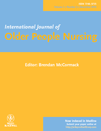Editorial: Learning how to support older people; menial subservience or expert skilfulness?
In this issue of the International Journal of Older People Nursing there are many papers that tackle topics which can be incorporated into the nursing curriculum. This points to a growing awareness of the potential for developing nursing expertise, knowledge and skills in caring for older people. The expertise of gerontological nursing is increasingly recognised and there is an increasing evidence-base to demonstrate its contribution to the health and care needs of older people. The idea that working with older people is dominated by practice that is ‘menial’ and delegated by others is part of the history of gerontological nursing but increasingly no longer part of our landscape of practice.
The papers in this issue challenge this idea of menial subservience by presenting a number of areas in which scholarly activity has been significant. This can be evidenced through research or discussion, but with the ultimate aim of informing practice. There are papers on different types of practice, and on placing our practice in a wider context. The instructions for authors’ writing papers for this journal emphasise this, asking writers to place their work against the background of related literature. That this literature exists at all is a signal that knowledge and understanding is expanding and developing. Where once we knew little, we can now say that we know a lot more!
This expansion of knowledge fits with the idea of expertise – there is a specialised knowledge and understanding, and we are able to access and use this. This expertise goes against some of the assumptions made about nursing with older people, that it is routine and mundane, and no knowledge is needed. Developing this understanding challenges the devaluing of our work, because if we develop knowledge, it informs what we do, when we do it and how we do it. We are able to think about options, alternatives and choices, and do this without the instruction of others. In this way we become autonomous and able to take part in care as equals.
In this process of developing knowledge we also take with us values and principles, those of the independence and dignity of older people, and the way that care should be planned with them, and with the support of family and carers. This becomes more important to me as I prepare to retire, with the likelihood that I will receive care at some point. I ask myself what I would like from carers, and the answer comes back – I would like them to deliver care and then go away, to let me get on with my life. This model of care definitely makes it a supportive activity – helping me to do what I want to do.
However, I am also aware in saying this, that it can make the education and training of nurses seem irrelevant, if all they do is follow the leads of patients. This is not necessarily the case, as supporting people requires skill and sensitivity. This has been striking in my recent experience of organising a textbook for nurses working with older people. A co-editor was an older person, and she constantly took me by surprise with her comments on what was written and how. Throughout the editorial process she read texts to ensure that they were respectful and empowering. In order to be this way nurses need information about what is acceptable to older people and be aware of how their beliefs and values impacts on their practice. This can be evident in curricula, where the skill of stepping back can be developed by paying attention to the value of independence – we learn enough to offer assistance when necessary, and then to leave people alone. This depends not just on knowledge but on understanding, and this should be developed by education. The papers in this journal can contribute to this, especially when they fit with these principles – it is a mark of expertise to know when ‘enough is enough’ and to move away!




